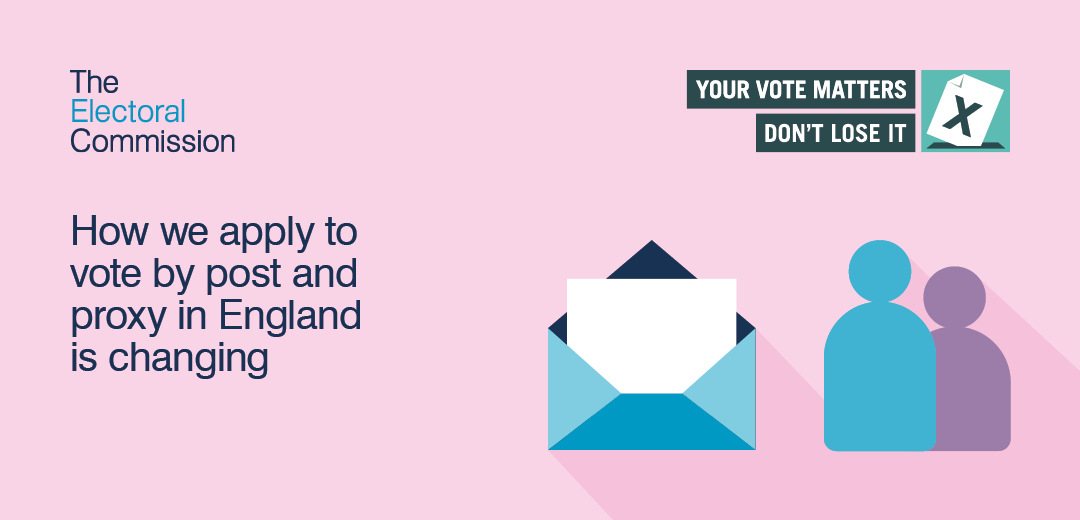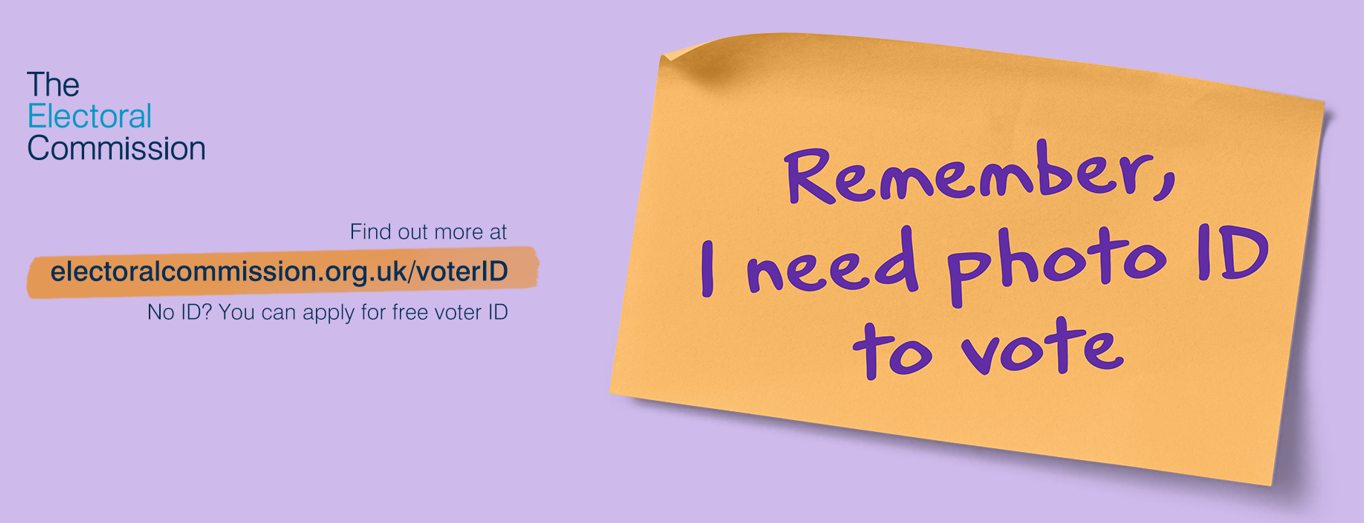Elections Act and Voter ID
Elections Act 2022
The UK government is making changes to the UK electoral system. The Elections Act contains measures that affect:
- elections and the way we vote
- campaigning and the rules on campaign spending and funding
- parliamentary oversight of the Electoral Commission
General information about the Act is available on the Electoral Commission's About the Elections Act webpages.
Voter ID
As part of the Elections Act, the UK Government has introduced a requirement for voters to show photo ID when voting at a polling station at most elections.
This new requirement applied for the first time in England at the local elections on Thursday 4 May 2023. To vote in person, voters must be on the electoral register and take a suitable type of photo ID to their polling station.
At the polling station, staff will ask for your name and address as usual and will request to see your photo ID. They'll check that the photo ID is one of the valid types and, as long as the photo looks like you and you're on the electoral register, they'll issue you with a ballot paper. There will be a space in each polling station for photo ID checks to be carried out in private if required.
Which forms of ID can I use to vote? Toggle accordion
You may already have a form of photo ID that is acceptable. For example:
• Passport (issued by the UK, any of the Channel Islands, the Isle of Man, a British Overseas Territory, an EEA state or a Commonwealth country)
• Driving licence (issued by the UK, any of the Channel Islands, the Isle of Man, or an EEA state - including provisional license)
• Blue badge
• Certain concessionary travel cards
• Identity card with PASS mark (Proof of Age Standards Scheme)
• Biometric Immigration document
• Defence identity card
• Certain national identity cards
Only original documents will be accepted; scanned images or copies will not be accepted. Expired documents will be accepted if the photo is still a current likeness of the voter.
For more information on which forms of photo ID will be accepted, visit electoralcommission.org.uk/voterID or call the Electoral Commission's helpline on 0800 328 0280.
What do I need to do if I don’t have an accepted form of ID? Toggle accordion
If you don’t already have an accepted form of photo ID, or you’re not sure whether your photo ID still looks like you, you can apply for a free voter ID document known as a Voter Authority Certificate. You can apply at voter-authority-certificate.service.gov.uk.
Alternatively, you can complete a paper application form and send this to the Electoral Services team at your local council.
If you need any help with applying for a Voter Authority Certificate or want to request a paper application form, contact Electoral Services.
Voting by post or by proxy Toggle accordion
Postal voters will not be affected and will be issued with their postal ballot papers as usual.
If you choose to vote by proxy then the person who you have trusted to vote on your behalf will have to take their own identification to be issued with a ballot paper.
Further information about voting by post or by proxy is available on our Electoral Register and Voting webpage.
Find out more Toggle accordion
Click on the files below for:
- The Electoral Commission's guide to voter ID. Everything you need to know about photo ID for the May 2023 English local elections.
- The Electoral Commission's easy read guide to voter ID. Everything you need to know about photo ID for the May 2023 English local elections in an easy read format.
The Electoral Commission have also produced videos in BSL about voter ID.
If you have any questions about voter ID or would like to find out more, go to electoralcommission.org.uk/voterID or call the Electoral Commission's helpline on 0800 328 0280.

Changes to postal vote and proxy vote rules
The Elections Act 2022 introduced several changes to postal and proxy voting regulations.
From 31 October 2023:
- All postal vote and proxy vote applications (except for emergency proxy applications) must contain a National Insurance Number or a reason why one cannot be provided.
- Voters can apply online for most types of postal vote and some types of proxy vote.
- Postal votes last for a maximum period of three years. Voters will need to reapply for a postal vote at the end of that time if they wish to continue to vote by post.
- Voters can act as a proxy for two people, regardless of their relationship. Anyone voting on behalf of UK voters who live overseas can act as a proxy for up to four people.
See our Electoral register and voting page for information about how to apply for a postal vote or proxy vote.
See the Electoral Commission’s website for more information about the changes to postal voting and changes to proxy voting.
Changes to returning completed postal vote packs by hand
If a voter isn't able to return their postal vote pack in time via Royal Mail, they can return it to the Civic Centre offices (during office hours) or at their polling station on polling day.
At the 2 May 2024 elections onwards, someone will only be able to hand in their own postal vote and the postal votes of up to five other people.
Political campaigners can only hand in their own postal vote, and postal votes for up to five other people that are either close relatives, or someone they provide regular care for.
Anybody handing in a postal vote in person at the council offices or at a polling station must complete a short form.
Other changes
Accessibility of elections Toggle accordion
From May 2023, changes were made which aim to provide greater flexibility and choice in how disabled voters are supported to vote at polling stations.
Further information is available on the Electoral Commission’s Improving the accessibility of elections webpage and on our Information for voters with disabilities webpage.
Changes to eligibility criteria for EU citizens Toggle accordion
There have been changes to the voting and candidacy rights of some EU citizens. The first scheduled elections these changes will apply to in England are the local elections in May 2025.
If you’re an EU citizen living in the UK, whether you can vote depends on the type of election and your citizenship.
The Electoral Commission's website contains information about the changes for EU citizens in UK elections. The Electoral Commission also have an online tool that EU citizens can use to find out which elections they can vote in.
Changes to the voting system for Police and Crime Commissioner elections Toggle accordion
Prior to May 2023, Mayoral elections and Police and Crime Commissioner elections used the Supplementary Vote (SV) system, where voters could choose a first and second choice vote. Now, voters will choose a single candidate on the ballot paper. This is the same system as UK Parliamentary elections and local elections in England.
Undue influence Toggle accordion
In November 2023, changes were made to simplify and clarify the offence of undue influence and define the types of illegal behaviour used to unfairly influence someone’s vote.
Further information is available on the Electoral Commission’s Preventing undue influence webpage.

